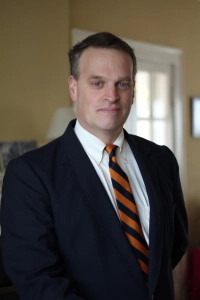As for you, do not be called ‘Rabbi.’
You have but one teacher, and you are all brothers.
Now it is not only clear from this text, but I have had it on authority from multiple sources that the word ‘rabbi’ means ‘teacher.’
Hence the King James version of this same passage reads,
And do not be called teachers; for One is your Teacher, the Christ.
Now, what exactly is Our Lord saying here? Is this a case of Our Lord using hyperbole as he was sometimes known to do (e.g. “And if thy right eye offend thee, pluck it out, and cast it from thee”). So under this interpretation, he might be saying,
Don’t get puffed up and arrogant because of your various titles, especially those that indicate that you might have some kind of wisdom!
Or perhaps, along the same lines, our Lord is simply exhorting us to humility? As if he is saying,
Given that teachers and instructors tend to be intellectually proud, do not be called teachers!
I am not a professor at an Ivy League school. Nor am I a professor at a tier 2 school, nor a professor at a tier 3 school. As a matter of fact, I am not really a professor at all!
No, I am a ‘teacher’ at a relatively small unknown (and unknown unfairly!) high-school. Nonetheless, even I know what it feels like to be intellectually proud! So I can imagine that our Lord might say “do not be called teacher” to me.

But could He have also been saying something else?
For example, could Our Lord have been saying,
Do not be called teachers, because guess what? There are no teachers among you!
Could it be that our Lord is not just using hyperbole, but is rather pointing out that, in the strict sense of the term, there are precisely no teachers among men? In other words, He is saying,
Call no man teacher, because God alone has claim to this title.
God alone is a teacher in the most interior and prime way. And therefore our Lord is reminding us that God alone is to be thanked and praised for being the cause of every good thing we have including our most prized possession, to wit, any small wisdom that we might have?
Why is this?
Well, just think about it for a minute. Think about what a teacher is. Isn’t a teacher supposed to be someone who teaches? And if someone teaches, doesn’t that mean that he has some sort of knowledge which he transfers from himself to a student?
In other words, since he knows something he is able to cause his students to know those same things through a process which we call “teaching.”

But wait a moment! Is this really possible?
Is a teacher really able to cause knowledge in his students?
Interestingly the Latin word for teacher is ‘doctor, doctoris’ and it is no wonder because we might ask the exact same questions about doctors. Our Lord might just as well have said,
Do not be called doctors.
This is because, as we all know, a doctor is not someone who makes sick people healthy. A doctor is rather someone who supposedly knows how to work with nature so that the sick will heal themselves!
As the great Heraclitus said,
Wisdom is to speak the truth and act, according to nature, giving ear thereto.

The wise doctor is, thus, someone who ‘listens to nature’ and ‘speaks’ and ‘acts’ according to what nature herself proposes in bringing a sick person to health.
But the important thing to remember is that the principles of health are already in the sick person! The doctor did not implant these seeds of health in his patient.
The seeds of his health are already there and the doctor merely knows how to aid those seeds to flourish and restore the sick person to health. He does this by either removing impediments or supplementing what nature herself needs in order to restore health.
And therefore, St. Thomas Aquinas points out that, just as the seeds of health are in the sick, so are the seeds of knowledge already in the ignorant. The teacher is one who aids and abets nature in bringing those ‘active’ seeds of knowledge to full flower.

Therefore, just as the doctor is said to cause health in the sick man with nature working, so also one is said to cause knowledge in another by the activity of the power of reasoning in that person, and this is called teaching. In this way one person is said to teach another and to be his teacher.
And he further distinguishes two ways that the mind might come to know,
Therefore, just as someone can be healed in two ways — first by the action of nature only, second by the collaboration of nature and medicine — so also there are two ways of acquiring knowledge. First, when the mind moves by its own natural power to an understanding of things previously unknown to it. This is called discovery (inventio). Second, when the mind is helped by an outside power of reason. This is called teaching (disciplina).
But the incipient causes of all of our knowledge have been implanted in us by God Himself. The wise teacher, like the wise doctor, is one who merely knows how to water and nourish those incipient causes of our knowledge. The teacher can not cause knowledge in a student except as a sort of secondary cause; the teacher might facilitate the growth of knowledge in his student from the active seeds of knowledge that were implanted in the student by God Himself!
It was He alone who planted in us the ability to understand. It was God who sowed the first principles in us and the light of intelligence by which those principles are known and in which all of our subsequent knowledge is rooted.
God alone is the primary and interior cause of our knowledge. God alone can be called teacher.
Now you dear reader, if you see for yourself what I am saying, and if this has provoked you to understand something new, may call me ‘teacher.’
But you may only call me ‘teacher’ in a secondary way. Because I have only enabled you to see something that you ‘knew all along’ in a seminal way.





This is the Light that enlighteneth every man coming into the world. What could this light be? Clearly not Grace, for not every man coming into this world has Grace. Rather, perhaps, the Word, being the concept and image of the Father, is somehow identified with the light that enlighteneth all men at their entrance into life – the light of the intellect, by which we make concepts and are in the image of God as well. – Thoughts from Thomas
This is interesting. On a related note I just happened to be reading St. Thomas’ commentary on Boethius’ De Trinitate Question 1 “Does the human mind need a new illumination of Divine light for knowledge of the truth?” And the first line of the body reads “The human mind is divinely illumined by a natural light according to psalm 4:7 “The light of thy countenance is sealed upon us, O Lord”
Not certain just what to do with this yet 🙂